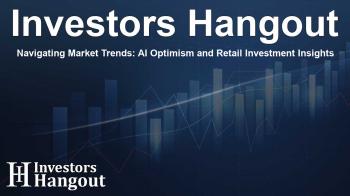Navigating Market Trends: AI Optimism and Retail Investment Insights

Understanding the Retail Investor Surge
American retail investors are diving into the market with exceptional enthusiasm this year. This increased buying activity marks a notable shift, as about half of US household wealth is currently invested in stocks. This statistic surpasses the previously established record during the dotcom bubble in 2000. As the saying goes, one could suggest adding a twist to the old adage: never bet against the US retail investor.
AI: A Double-Edged Sword for Investors
Much of the bullish sentiment surrounding stock prices can be attributed to the excitement surrounding artificial intelligence (AI). Experts have expressed concerns that we are facing a modern-day implementation of the central-planning illusion—believing that comprehensive societal systems can be perfected through technological means. This concept reflects a broader skepticism around the capabilities of AI in shaping economic outcomes, as highlighted by analysts Gary Saul Morson and Julio M. Ottino.
The Skepticism Towards AI Advancements
Despite the growing hype, it remains uncertain whether the expectations surrounding AI are entirely justified. Gary Marcus points out a staggering reality: even the most sophisticated AI models today struggle with tasks as fundamental as playing chess. This raises a crucial question for investors regarding the sustainability of current market optimism fueled by AI technology.
The Risks Ahead for the Stock Market
While retail investors might appear unwavering in their confidence, signs indicate that a shift in market sentiment could be on the horizon. According to Peter Berezin, current evaluations suggest that we might be on the verge of what he describes as a 'Wile E. Coyote moment' for the S&P 500. This phrase embodies the danger of an abrupt realization of overvaluation, reminiscent of the character's unexpected tumble in classic cartoons.
Indicators of Market Vulnerability
Market analysis shows several signs of vulnerability despite optimistic investor behavior. As investors continue to pour money into stocks, there may be underlying risks that could lead to rapid market adjustments. These prospects should prompt retail investors to reassess their strategies and remain vigilant amidst evolving economic landscapes.
The Dollar's Decline: A Market Indicator
In another area of the financial ecosystem, the declining value of the dollar signifies changes that may not have been fully acknowledged by investors. John Authers explains that the dollar's fall contradicts expectations, especially in light of high-interest rates that typically bolster its value. Instead, this decline reflects growing skepticism regarding US economic policies and institutions. Such trends underline the complex, interconnected nature of today's global economy.
Rethinking Investment Strategies
As the dynamics of the market evolve, investors must adapt their strategies accordingly. Recognizing the potential pitfalls and staying informed about various economic indicators is crucial for navigating these turbulent times. Retail investors should contemplate the broader implications of their investment choices and remain cautious, as abrupt market realizations can occur unexpectedly.
Frequently Asked Questions
What drives the current surge in retail investment?
Retail investors are currently investing at an aggressive pace, driven by confidence in the stock market and excitement around AI technology.
Why is AI compared to a central-planning illusion?
The concept suggests that relying on technology to optimize complex systems can lead to misplaced confidence in its ability to control economic outcomes effectively.
What does the 'Wile E. Coyote moment' signify?
This term refers to the risk of sudden market corrections when investors realize the overstated value of their investments, akin to the character's unexpected fall in cartoons.
How is the dollar's decline affecting the market?
The dollar's value has decreased due to a loss of confidence in US economic policies, indicating potential vulnerabilities within the overall financial system.
What should retail investors be cautious of?
Investors should be aware of market volatility and adjust their strategies as needed, focusing on informed decision-making in response to economic changes.
About The Author
Contact Ryan Hughes privately here. Or send an email with ATTN: Ryan Hughes as the subject to contact@investorshangout.com.
About Investors Hangout
Investors Hangout is a leading online stock forum for financial discussion and learning, offering a wide range of free tools and resources. It draws in traders of all levels, who exchange market knowledge, investigate trading tactics, and keep an eye on industry developments in real time. Featuring financial articles, stock message boards, quotes, charts, company profiles, and live news updates. Through cooperative learning and a wealth of informational resources, it helps users from novices creating their first portfolios to experts honing their techniques. Join Investors Hangout today: https://investorshangout.com/
The content of this article is based on factual, publicly available information and does not represent legal, financial, or investment advice. Investors Hangout does not offer financial advice, and the author is not a licensed financial advisor. Consult a qualified advisor before making any financial or investment decisions based on this article. This article should not be considered advice to purchase, sell, or hold any securities or other investments. If any of the material provided here is inaccurate, please contact us for corrections.

